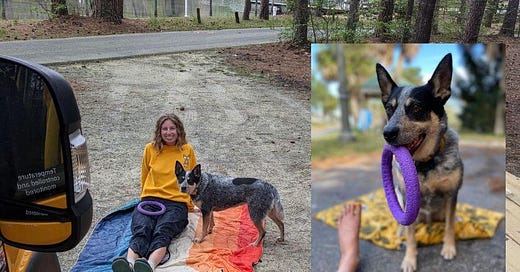Hey neighbors, what if we all played with our dogs?
First written on April 14th. Edited and published a little later.
When I was a kid, I always wanted to pet other people’s dogs. Now I want to play with them.
The mutt in the campsite across from us kangaroo jumps when anyone walks by. She has three toys to thrash — she does so with gusto, even picking up the corner of her massive dog bed and dragging it a couple feet in enthusiasm when she sees me tugging with Scout — and looks like fun. (Sean has also given her an award for being the only dog here, besides our own, who hasn’t barked a bunch. I wish that wasn’t such a rare accolade.)
I told Sean she reminds me a bit of Mystic, the foster puppy we cared for on two separate occasions back in 2022. He agreed. That’s what I was thinking too. We now call her Mystic-Dog. She’s tall, and lanky, and have I mentioned looks like so much fun?
Mystic-Dog’s owners are rarely in sight — I think they’re hiding from Outer Banks’ infamous wind in the camper while she roams the length of her tie out — and it’s taking some self control not to call over. You have this incredible dog, I’d say. I can tell from over here! She’s begging you to play.
If you’re not going to, then at least can I?
I’ve come to believe most dogs, especially those we see in campgrounds, could benefit from more play. Mystic-Dog radiates good nature. She’s excited, but she’s quiet, and she doesn’t yank at the end of her tether when we walk by on our way to the beach. The same can’t be said of our other canine neighbors — every morning and evening they raise a chorus as people head to the bathroom buildings, send kids out on bicycles and scooters, take their own dogs (who often return the yelling with equal verve) for potty breaks.
This is typical of developed recreation areas. As a general rule Sean and I don’t go on “casual walks” in campgrounds like this. We only pass other sites if we must in order to get to another trail — walking aimless loops, weathering barking and growling and lunging at what seems like every turn, is the last thing Scout wants to do.
I used to feel strongly that these dogs needed more training. Impulse control, place commands, neutral exposure, clear boundaries! Those things wouldn’t hurt, I think. I’m still thankful we’ve worked on all of them with Scout.
But I keep wondering how much the campground cacophony might improve if fellow visitors just played with their dogs.
I can hear you now: It’s too simple of an idea. Too rosy, too shallow. Play is fine, but it’s not a cure all. And you’re right — it’s no panacea.
But it’s the closest thing I’ve found so far in the dog world.
How many cases of reactivity are rooted in a lack of fulfillment? How many dogs lose their heads when they see us throwing a puller ring for Scout because they desperately want to join in on the game? How many days can a canine spend tethered to a picnic table, watching everything else go by, without any meaningful release for their own energy and enthusiasm?
I see it with Scout every day: She relaxes best when her needs have been met. One of those needs is biological fulfillment — satisfaction of at least some innate canine desires — and one way to do that is play. (Our heeler’s favorite game is tug, but even “tiny fetch” on the bed of our van does something for her psyche.)
We have to meet her other needs too, of course. We had to teach her how to settle in distracting environments. We had to practice telling her when the fun is over. (I’m incapable of tugging and fetching and dancing the entire day even if she’d like to.) And it took years to build her confidence and engagement to where we can play just about anywhere. Tug in a busy campground while other dogs bark at her? Yeah, right. That was a pipe dream a few years back.
But now that we’re here, all the “training” we’ve done feels like polish on a foundation of fulfillment. When we put play — true, engaged, mutual play — at the center of our shared life, everything else got better.
I don’t think I’m crazy for guessing it might do the same for fellow dog-human teams.





